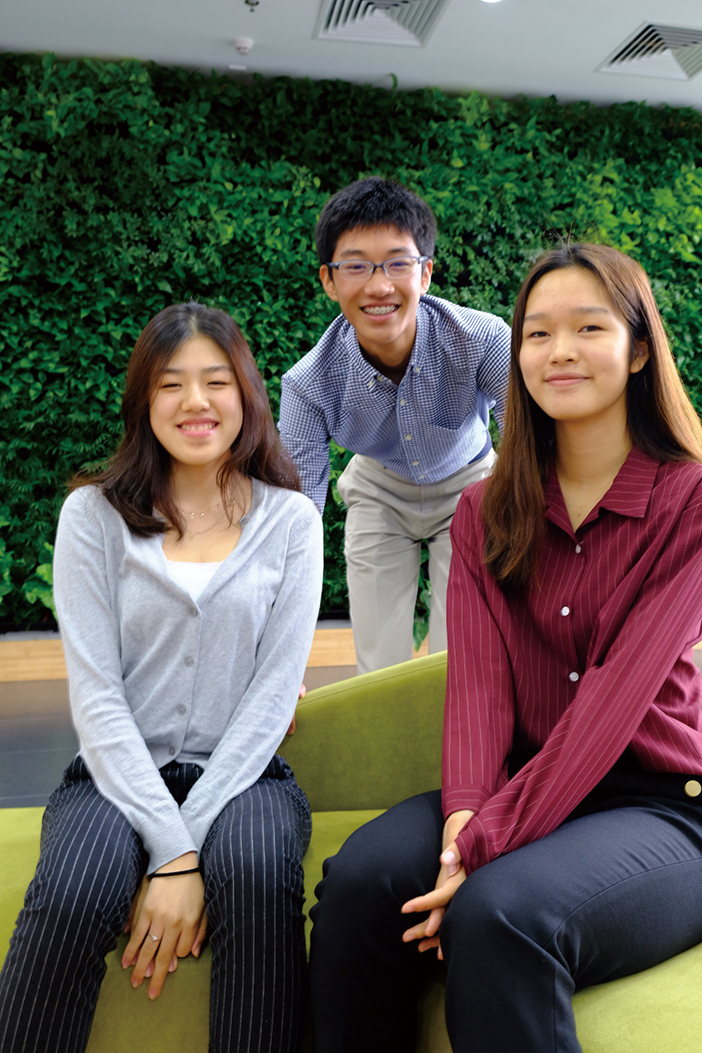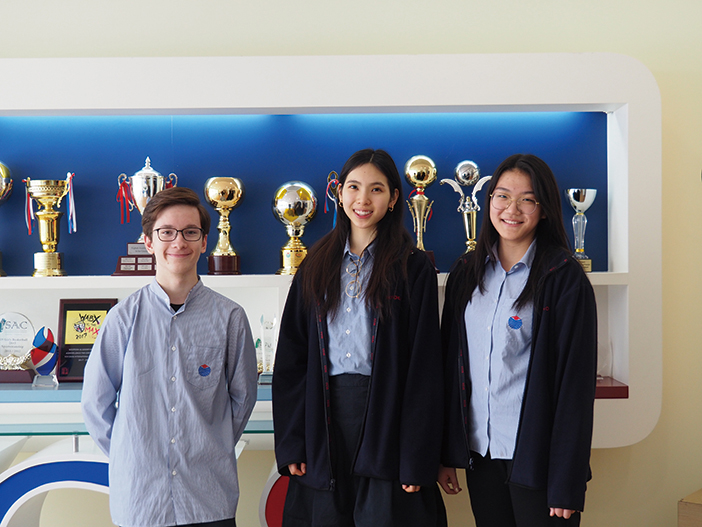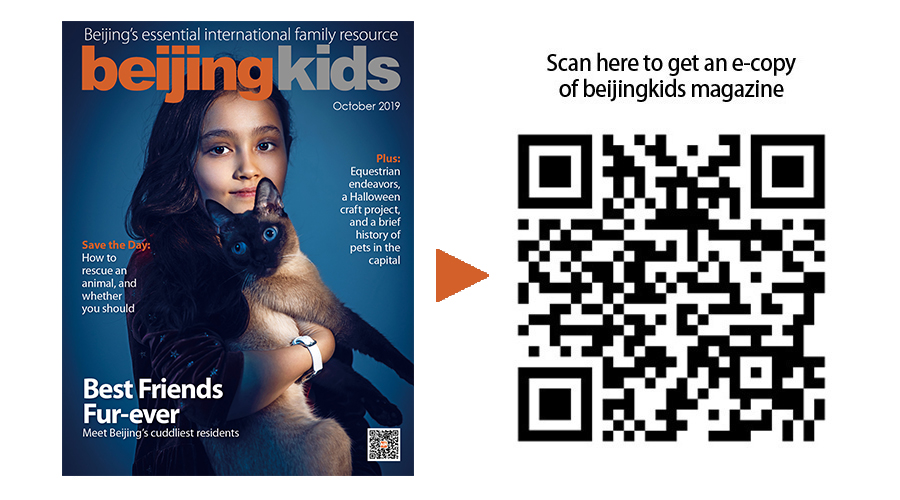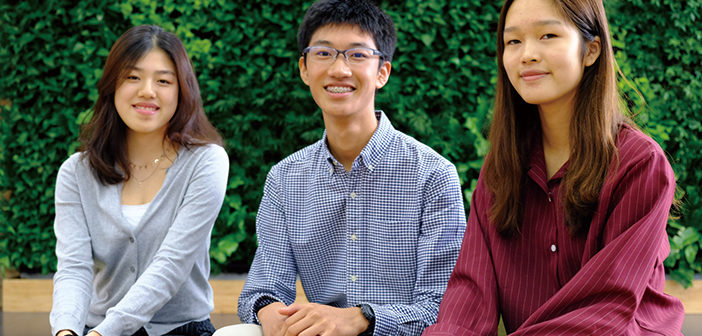From an early age, Tao L. nurtured an interest in animal welfare, slowly cultivating his knowledge of vulnerable species and populations through online articles and videos, until eventually that interest had blossomed into a full-blown call to action.
He began volunteering at a local animal shelter and while he was happy to be dedicating his time to a cause he cared deeply about, he quickly decided that he wasn’t content to merely work within the confines of an organization already on his side. As often happens with young activists, he realized that if he wanted to have a greater, more meaningful impact, he’d have to take his message to people who weren’t involved in the fight yet. That’s why last year Tao L., now in grade 12, started the Animal Welfare Club at Dulwich College Beijing (DCB).
“I’ve always been passionate about animal related topics,” Tao L. tells beijingkids. “I really like animals and I’ve done many things by myself. I volunteer at a local animal shelter, I started an Instagram account to raise awareness about cetaceans in captivity, like whales and dolphins, and I wanted to get more people involved to raise more awareness.”
With more of the world’s attention turning to the issue of climate change, humans are becoming increasingly aware of the role they play on the global environmental stage. Across every industry, big questions are being asked, and while some of them address social issues like pollution from manufacturing, others are geared towards the roles and responsibilities humanity assumes in the greater animal kingdom.
As the first generation to be raised with an acute awareness of how we are affecting the world around us, kids are leading the charge in considering what it means to be conscious stewards of the earth. As a result, they are both spearheading and joining efforts that champion the causes of animal welfare in their schools and communities.
As Laura Husté, DCB’s Animal Welfare Club’s supervising teacher explains, “Developing the youngest generations’ knowledge about animals, locally and globally, will help create awareness, opportunities for change and action.”

Tao L, Jessica T, and Lia C of DCB’s Animal Welfare Club
Tao L.’s club began as a small cohort made up of his close friends, however after they had the opportunity to share their mission at DCB’s Extracurricular Activities Fair, the membership ballooned to around 20 students representing Years 7 through 12.
“I was surprised to see so many younger students interested in my club and passionate about our causes,” says Tao L. “I’m also just really happy to see the increasing amount of people who care about the welfare of animals [and]I was surprised to learn that some of the very young students actually are quite knowledgeable when it comes to problems related to animal welfare.”
According to fellow club members, Jessica T. and Lia C., the reason for this sharp increase in enthusiasm is twofold.
On the one hand, students at Dulwich were eager to join a club like this. As Jessica T. explains, “I think there are a lot of students in this school who have pets, who are passionate about helping out, but they don’t have this platform to do it on, and I think Tao’s club gave them that.” When it came to drumming up members, she states that, “it was quite easy to attract other students who are passionate about the same causes.”
Perhaps more important though is what the two girls had to say about Tao L. himself. In articulating the young animal activist’s devotion to his cause, one gets the sense that his unbridled excitement about wildlife preservation is nothing short of contagious.
“I’ve always been really interested in environmental and animal issues,” says Jessica T. “I don’t think I’m as knowledgable about the issues as Tao is, he’s always telling me stuff, sending me articles and videos, and it’s really great.” She goes on to say that, “Tao is very much the person you go to if you want to help or you want to learn more.”
Lia C. expresses a similar sentiment. “I have a dog myself so I’m really into animals, but Tao’s ambition and compassion towards animal welfare also got my interest.”
No matter how the students came to the club, or how knowledgeable they are before joining, one thing is clear; they all possess a shared desire to make a difference. ”I just wanted to be a part of an organization where we can really make a change and see results in something that we’re passionate about,” says Jessica T.
Given the scope of the problem however, it can sometimes feel daunting to try and tackle these issues head on. According to Husté, “what [students]often don’t realize is that they can make changes in their communities. Little things like reminding them that dogs, cats, and other pets are for life and not only for a few weeks, that it is better to adopt than to buy bred animals, that to help the bees they just need to plant flowers and not use pesticides. The list is long, and it makes a huge difference.”
Thanks to all of their hard work and grassroots efforts, that change is already beginning to happen. For example, during last year’s Founder’s Day celebration at DCB, the club set up a booth where they sold fruits, ultimately raising RMB 4,585, which was donated to a local animal shelter.
During an Earth Day event organized by the Sustainable Development Goals club, the group erected a panel that featured photos and QR codes with links to more information about a range of topics such as poachers and the ivory trade, plastic pollution in the oceans, shelter animals and adopt-don’t-shop policies.
What’s clear from these two activities is that DCB’s Animal Welfare Club understands the importance of looking at the problem on both a micro and macro level. “Tao talks about what is happening globally and locally,” says Husté. Globally, the students recently produced materials that educated the rest of the school about “animal-based tourist attractions such as elephant rides or pictures with drugged bears and tigers,” whereas on the local level, Tao L. always knows “which animal shelters the students can volunteer at and who in the local community needs more support.”
DCB’s Animal Welfare Club certainly isn’t alone when it comes to spreading the word about animal rights.
At the beginning of last year, the founder of worldwide animal advocacy organization, A Voice For Animals (AVFA), stopped by the Yew Chung International School of Beijing (YCIS Beijing) campus and gave an impassioned speech about the work the organization was doing, and what the students could do to get involved. In an unprecedented outpouring of support, the CAS program — Creativity, Activity, Service — quickly filled up with kids that wanted to join the effort. When asked how many students signed up, the group’s supervising instructor, Prachi Gupta, jokingly says “too many!”
Nevertheless, the two groups have been working together ever since, tirelessly raising money and awareness of the plight that Beijing’s homeless pet populations face.
“If humans didn’t build all these big cities, animals wouldn’t have any problems. So we are limiting down environments for pets and animals, and it’s our responsibility to care about them,” says 16-year-old club member Jakob Q.
Fellow club member Catherine C. agrees. “We are human beings, and we kind of dominated this planet. I believe there is a connection between animals and the environment. And I think helping the animals is a way to contribute to the ecosystem.”

Animal Club at YCIS
Aware that they can’t rescue every dog and cat on the street, the Animal Club at YCIS has come up with other ways to help alleviate the suffering that shelter pets experience. “We made dog toys, cat toys, and pet beds out of recycled clothes and donated them to shelters. I thought that was really fun and for a good purpose,” explains Emmie S.
The club also spent all of last year developing co-curricular activities with AVFA such as fundraisers and dog food drives, the largest of which was their charity dinner, “Animazing Night,” at The Taj Pavilion restaurant in Beijing. Through a combination of ticket sales and raffle tickets the night of the event, the Animal Club was able to bring in about RMB 7,000, which enabled AVFA to fund animal medication, critical surgeries, and the construction of a new dog shelter in the city.
“It’s plain to see that our students have a strong commitment to charity. They are filled with kindness and generosity, and are motivated by charitable causes,” said Gupta in a press release about the event. “All this engagement from students throughout secondary school made A Voice for Animals seem like a fitting beneficiary of the annual charity dinner.”
The students understand that this multifaceted approach to activism, contributing both direct service in the way of volunteering at shelters and indirect service through fundraising and gala events, is necessary to maximize their impact and fully realize the club’s potential. But it’s also clear that the students truly cherish the moments they get to spend with animals, relating with them on a deeper level.
“They want to connect with the animals,” says Gupta. “They want to know who they are raising the money for. It’s not just about raising money and WeChat moments, they want to be connected, they want to feel how these animals are rescued and how they’re adopted.”
Some of the club’s members even have future aspirations, which their work with the Animal Club is helping to develop and make possible.
Emmie S., who’s currently in Year 11, is hoping to do an internship program with a local veterinarian clinic that would provide her with valuable hands-on experience and insight, setting her up for a career working with sick and injured animals.
Likewise, while not intending to make a career out of animal welfare, Jakob Q., Year 12, certainly has plans to continue keeping pets and raising money for them later in life. “I will definitely have pets when I get older. If there’s a charity group or someone raising money for pets, I will give money to the charity because animals are living things and they should be cared about.”
The clubs at DCB and YCIS are a powerful testament to the changing attitudes that make up our collective worldview, and given that these organizations are student-led, it’s obvious that kids are feeling the urgency in a way that parents rarely have.
Their efforts to protect animals on a global and local scale show a profound understanding of the inextricable link between climate change and animal welfare. As the world continues to get pummeled by natural disasters and droughts, animals in the wild are increasingly at risk of getting caught up in the devastation. What’s more, as these catastrophic events touch down in our own backyards, our very own pets, and those without owners struggling to survive on the streets, are made even more vulnerable and defenseless.
As the old adage goes, the children are our future, but this idea has traditionally put the onus on adults, making them the ones responsible for children. In the 21st century however, young people are increasingly taking the baton of progress from the older generation. With a slate of new tools at their disposal, from global interconnectedness via social media to an unrivaled collection of academic information at their fingertips, they’re unabashedly pushing us towards a future of their own creation. Because after all, it’s a future they’re going to have to live in. And the work that the students at DCB and YCIS are doing will have a genuine and admirable effect for generations to come.

This article appeared in the beijingkids October 2019 Family Foodies issue




